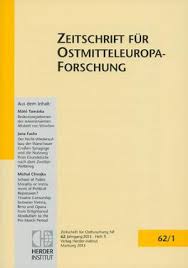Vorposten – oder auf verlorenem Posten? Die Universitäten Straßburg und Jur’ev 1872/1887-1918
Outposts - or lost posts? The Universities of Straßburg and jur'ev 1872/1887-1918
Author(s): Trude MaurerSubject(s): Christian Theology and Religion, Political history, Higher Education , 19th Century, Pre-WW I & WW I (1900 -1919)
Published by: Verlag Herder-Institut
Keywords: Outposts; lost posts; Universities of Straßburg and jur'ev; 1872/1887-1918;
Summary/Abstract: In the Modern Era, European universities rooted in Graeco-Roman culture and Christianity and using Latin as a lingua franca, were transformed into institutions of national states. They played a seminal role in national movements and were even considered bastions or outposts of the national cultures of the respective states. This was particularly true of border regions and recently annexed provinces of uncertain or mixed allegiance. Based on a re-examination of germanization and russification in the late 19,h Century and, in particular, on an exploration of World War I (when the universities of Straßburg and Jur'ev found themselves in the war zone) this article analyzes the closing of these two universities. It discusses the question to what extent this was a consequence of external developments or of the relations between different national groups within these universities and of the traditional tensions between regional and imperial interests. On the one hand, russification and germanization were not enforced as rigorously as the contemporary press and traditional historiography maintained. It is true that most Alsatian and Baltic German teachers were driven out or (by language requirements) forced to resign or retire. At the same time, students of the dominant nationality and from the interior of both empires were specifically recruited for these universities. On the other hand, individual teachers were allowed to use French or German respectively, and concessions were made to locally dominant religious groups (by setting up a Catholic Theological Faculty in Straßburg University and allowing professors of the Lutheran Theological Faculty in Jur'ev to continue teaching in German up to 1916). However, by these very measures and by the different cultures of their students and staff, these universities were internally divided. Apart from formal relations there were hardly any social contacts between the various groups. Their finely graded positions within the university and the discrimination against all Alsatians and Baltic Germans during the war made the self-assertion of these universities ever more complicated in the face of the advancing enemy troops. And whereas there seemed to be no doubt about the preservation of these universities, the question for whom and (in the case of Jur'ev) where they should continue their work was highly disputed. When, at the outbreak of war, loyalties to the respective empires had been put to a test the non-dominant ethnic groups had clearly passed it. The increased discrimination, however, made them hope for the victory of the enemy of their home country (i.e. France and Germany). In the end the invading and occupying power were able to close the former institutions collaborating with local members of the non-dominant groups. The reestablished (or rafher new) German university in Jur'ev (Dorpat), however, was a unique (and stränge) phenomenon in the history of European universities: It was under the Jurisdiction of the German army and was staffed mainly by scholars serving in this army cooperating with some Baltic German members of the formerly Russian university. German regulations limited its autonomy more than the Russian authorities had ever done. But it faded away with German military power. Though German scholars in Straßburg and Russians in Jur'ev stood by their posts to the very end, the collapse of these universities only proved that they had in fact been fighting a lost cause.
Journal: Zeitschrift für Ostmitteleuropa-Forschung
- Issue Year: 56/2007
- Issue No: 4
- Page Range: 500-538
- Page Count: 39
- Language: German

